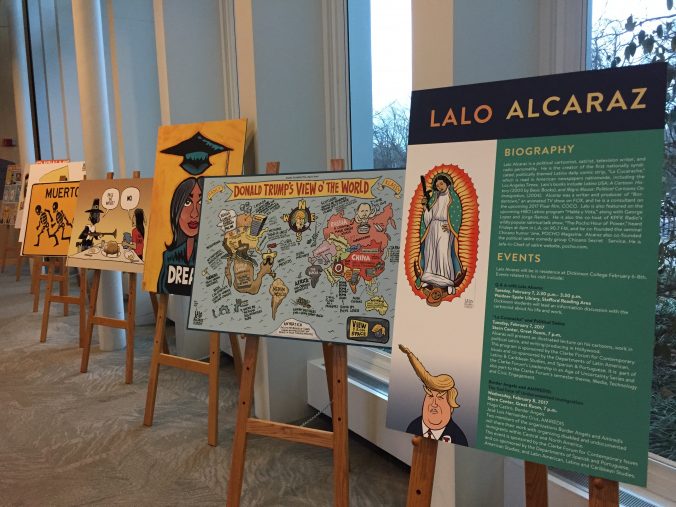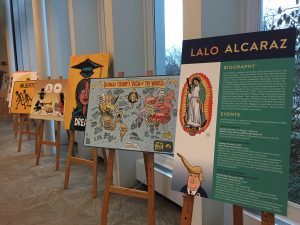Tag: Latin America
Carol May ’18, Abroad Columnist
September 22, 2016
Filed under Life and Style
Photo Courtesy of Carol May ’18/ The Dickinsonian
Before leaving for my abroad experience in South America, I asked everyone I knew for advice as to how to make the most out of being abroad. Above all else, I was told to always say “yes” when asked to try something new. Little did I know, this one piece of advice would help me make friends with people in class, explore the local sights, and eat some of the best meals I’ve ever had.
My first “yes” occurred in my Political Sociology class here at UNCuyo (our university in Mendoza). Being the only exchange student in the class and still fumbling my way through the Argentine Spanish filled with “vos” and “che” made for a very nerve-wracking experience. But as I was sitting in class, a girl next to me asked if I wanted some Mate, a bitter tea that Argentines consume constantly. I heard the advice of others running through my head, and said “yes”. From there, I got to know the girl and other people in my class simply by sharing Mate. This first “yes” has given me a network of people to help me with my classwork and with anything else I may need while in Argentina.
The second “yes” came when my host sister asked if I wanted to go to Portreillos with her and some friends. Having no clue what that even was, I just immediately said “yes” and I am so glad I did. Despite having to wake up relatively early to get there, I have no regrets about this “yes”. My host sister and I drove over an hour outside of Mendoza and arrived at the foothills of the Andes near a huge lake. Other than the incredible scenery, we shared asado, the sacred art of grilling meats in Argentina, and I met a whole group of her friends. Despite being overwhelmed by having fifteen people talking in crazy fast Spanish all at once, I felt like I was truly experiencing the culture here in Argentina.
Finally, saying “yes” to a dinner out with my host mom and her friend, led me to one of the best meals I’ve had in my life. Even though it was a Friday night and I planned on going out with my friends, I opted instead to eat with my host mom. We went to one of the best restaurants in the city where we shared steak, pasta, empanadas, and of course a wine tasting. While the food was incredible, I also was able to talk with the two women about everyday life in Argentina and share aspects of my culture with them.
As much as being abroad is enjoying your time in a specific place, it is equally about cultural exchange. I love being able to share my experiences from Dickinson and the United States with people here almost as much as I love learning about the culture here. By saying “yes”, I have stepped out of my comfort zone in so many ways and cannot wait to see where other “yes[’s]” take me. ¡Hasta luego!
Source: http://thedickinsonian.com/life-style/2016/09/22/say-yes-to-argentina/
A week of events co-sponsored by the Center for Global Study and Engagement; the Latin American, Latino, and Caribbean Studies Program; the Office of Diversity Initiatives; the Community Studies Center; and the departments of Anthropology and History
Monday, October 1, 7 p.m., East College 405
Mbya, tierra en rojo [Mbya, Red Earth or We Are the Indians], 2008. Film presentation followed by Q&A by filmmaker Valeria Mapelman
Tuesday, October 2, 7 p.m., East College 405
Territorio en Resistencia: Indigenous Mobilization in Contemporary Bolivia. Lecture by Bolivian sociologist and social activist Hernán Ávila Montaño
Wednesday, October 3, 7 p.m., East College 405
Octubre Pilagá: Relatos sobre el silencio [Pilagá October: Tales about Silence], 2010. Film presentation followed by Q&A by filmmaker Valeria Mapelman
Thursday, October 4, 7:30 p.m., Althouse 106
Indigenous Latin America: Reclaiming the Past and Building the Future. Roundtable with Valeria Mapelman and Hernán Ávila Montaño. Co-moderated by Professor Maria Bruno and Amanda Wildey (’13)
Valeria Mapelman
After ten years working in photography and film in Chile, Valeria Mapelman returned to her native Buenos Aires in 2010 to co-direct her first feature-length documentary, Mbya, Tierra en Rojo [Mbya, Red Land or We Are the Indians], with Philip Cox. Filmed with the Mbya Guarani communities of the Kuña Pirú Valley, in Northeastern Argentina, this documentary presents an intimate view of the challenges faced by the Mbya Guarani to keep sustainable communities in a hostile sociocultural and political environment. Praised by critics for its complex portrayal of the Myba reality that avoids condescension, this film received the Human Rights Prize at the 2006 Buenos Aires Festival of Independent Cinema. In 2005, she began working with testimonies of survivors of the 1947 massacre in La Bomba, among the Pilagá communities of northeastern Argentina. These testimonies formed the bases of her 2010 film Octubre Pilagá, Relatos sobre el Silencio [Pilagá October: Tales about Silence] and of her collaboration with the Research Network about Genocide and Indigenous Policies in Argentina which resulted in the multi-authored book History of Argentine Cruelty: Julio A. Roca and the Genocide of First Peoples, coordinated by Osvaldo Bayer. She also produced Debates about Genocide of Argentina’s First Peoples and the Limits of Justice, an interactive DVD in collaboration with the Course on Human Rights of the University of Buenos Aires.
Hernán Ávila Montaño
Bolivian sociologist and social activist who has been working with indigenous communities of the Bolivian Amazon since 2001. From 2001-2004, as part of the NGO Centro de Investigación y Promoción del Campesinado (CIPCA), Hernán worked with the communities surrounding the town of San Ignacio de Moxos in the process of defining and legalizing their indigenous lands. In 2005, he began working with the NGO Centro de Estudios Jurídicos e Investigación Social (CEJIS) as an assistant to Miguel Peña, one of five presidents of the Constitutional Congress, in the writing the new Constitution after the election of Evo Morales which defined Bolivia as a plurinational state. He has also worked with the movement of the Indigenous Territory of the Isiboro-Securé (TIPNIS) to protest, and ultimately to stop, the construction of a paved road through this protected region. He is currently the director of CEJIS in Trinidad, where he advises indigenous groups in the Department of Beni on their defense of their territorial and cultural rights. Through this experience, he is considered to be an expert of the new Bolivian Constitution, particularly the components that define the rights and autonomy of indigenous groups to defend and determine the uses of their territories


